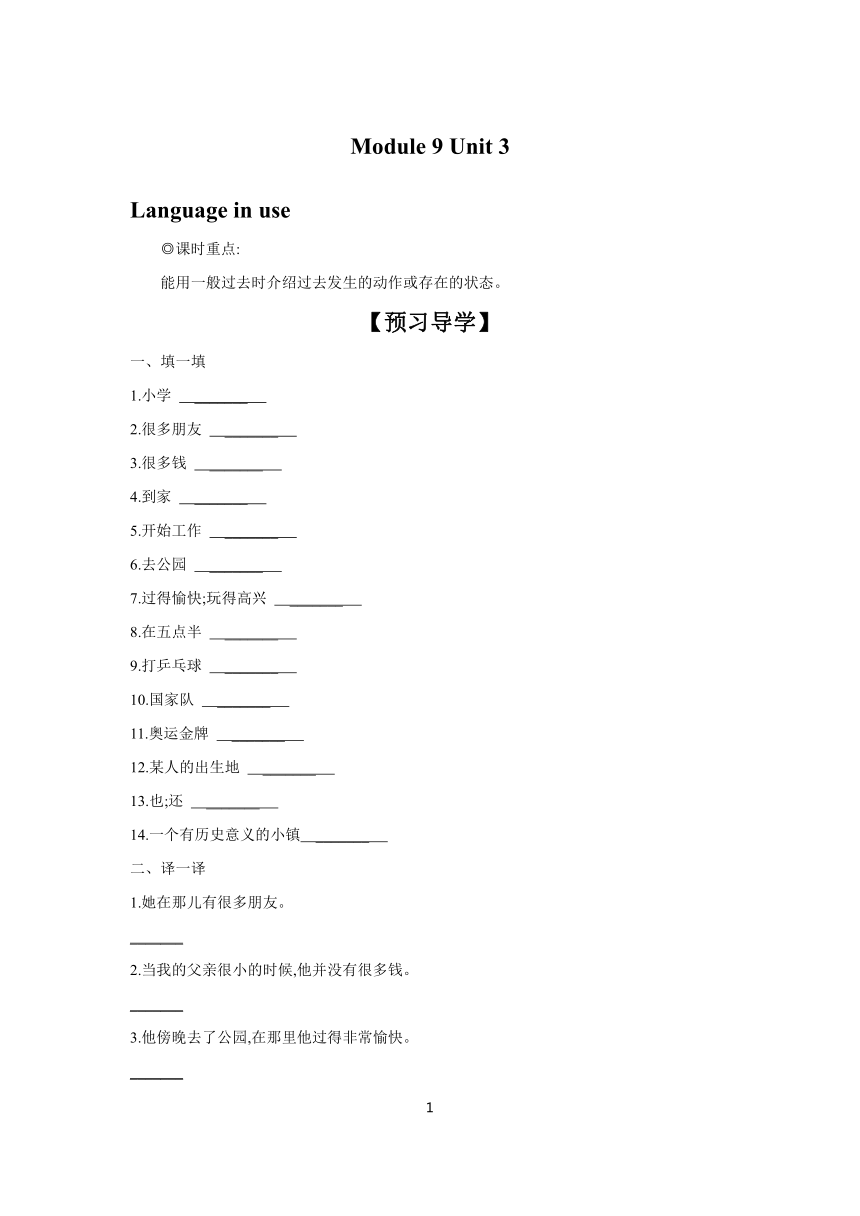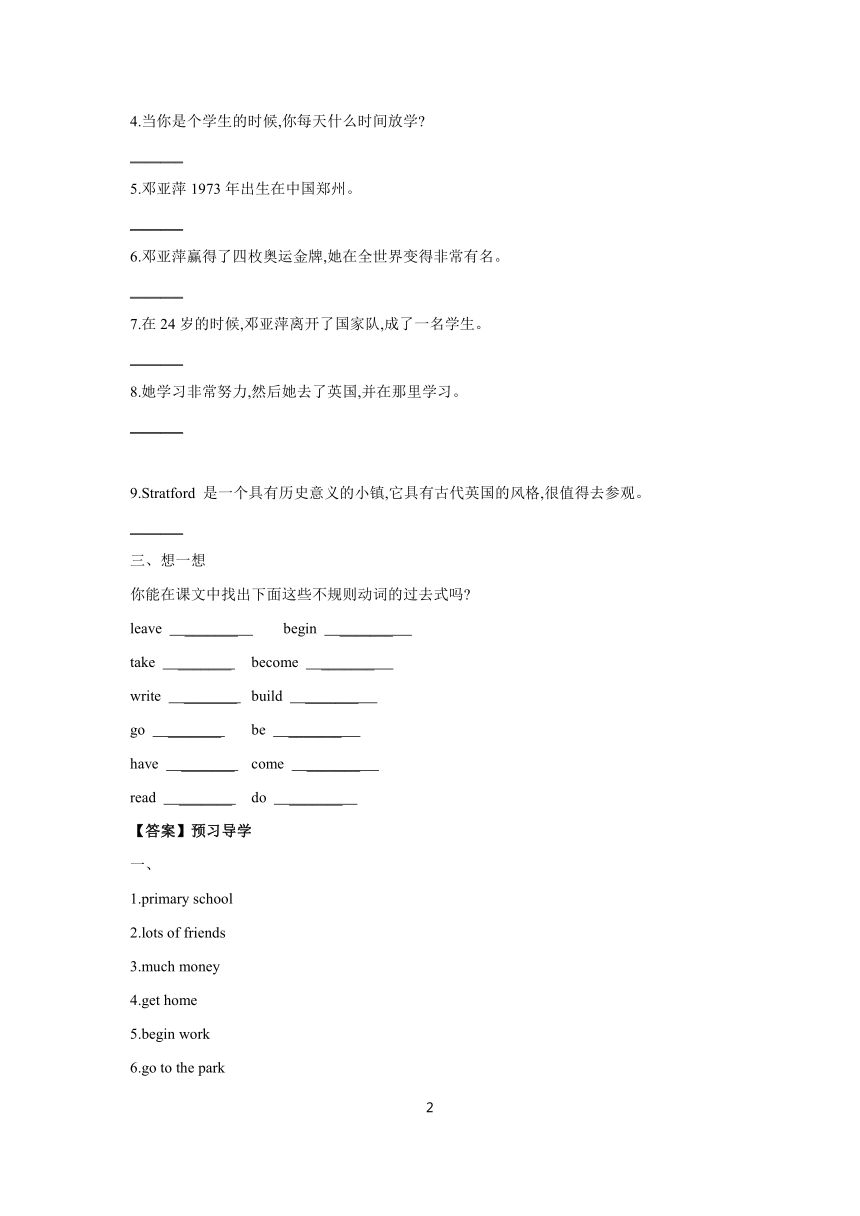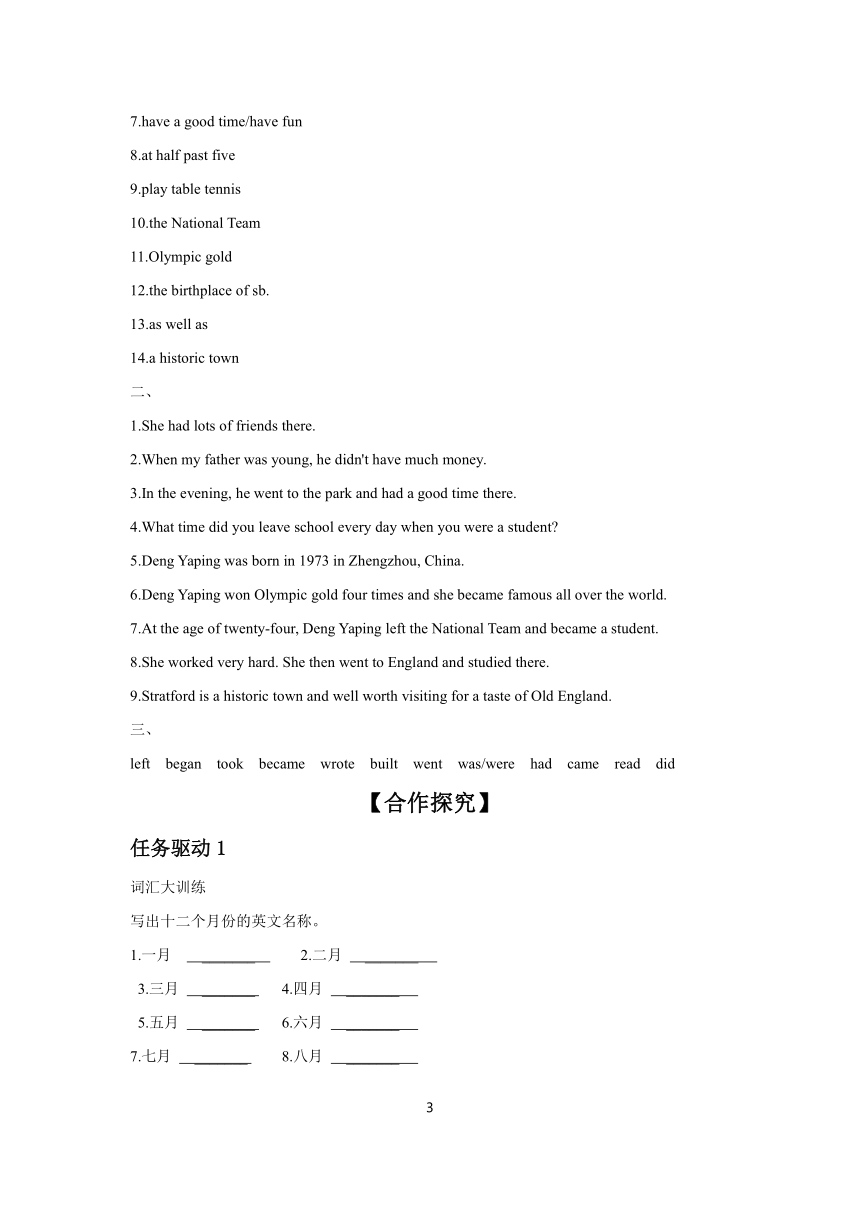Module 9 Life history Unit 3 学案 2023-2024学年初中英语外研版七年级下册(含答案)
文档属性
| 名称 | Module 9 Life history Unit 3 学案 2023-2024学年初中英语外研版七年级下册(含答案) |

|
|
| 格式 | docx | ||
| 文件大小 | 24.9KB | ||
| 资源类型 | 教案 | ||
| 版本资源 | 外研版 | ||
| 科目 | 英语 | ||
| 更新时间 | 2024-02-20 00:00:00 | ||
图片预览



文档简介
Module 9 Unit 3
Language in use
◎课时重点:
能用一般过去时介绍过去发生的动作或存在的状态。
【预习导学】
一、填一填
1.小学 _______
2.很多朋友 _______
3.很多钱 _______
4.到家 _______
5.开始工作 _______
6.去公园 _______
7.过得愉快;玩得高兴 _______
8.在五点半 _______
9.打乒乓球 _______
10.国家队 _______
11.奥运金牌 _______
12.某人的出生地 _______
13.也;还 _______
14.一个有历史意义的小镇 _______
二、译一译
1.她在那儿有很多朋友。
_______
2.当我的父亲很小的时候,他并没有很多钱。
_______
3.他傍晚去了公园,在那里他过得非常愉快。
_______
4.当你是个学生的时候,你每天什么时间放学
_______
5.邓亚萍1973年出生在中国郑州。
_______
6.邓亚萍赢得了四枚奥运金牌,她在全世界变得非常有名。
_______
7.在24岁的时候,邓亚萍离开了国家队,成了一名学生。
_______
8.她学习非常努力,然后她去了英国,并在那里学习。
_______
9.Stratford 是一个具有历史意义的小镇,它具有古代英国的风格,很值得去参观。
_______
三、想一想
你能在课文中找出下面这些不规则动词的过去式吗
leave _______ begin _______
take _______ become _______
write _______ build _______
go _______ be _______
have _______ come _______
read _______ do _______
【答案】预习导学
一、
1.primary school
2.lots of friends
3.much money
4.get home
5.begin work
6.go to the park
7.have a good time/have fun
8.at half past five
9.play table tennis
10.the National Team
11.Olympic gold
12.the birthplace of sb.
13.as well as
14.a historic town
二、
1.She had lots of friends there.
2.When my father was young, he didn't have much money.
3.In the evening, he went to the park and had a good time there.
4.What time did you leave school every day when you were a student
5.Deng Yaping was born in 1973 in Zhengzhou, China.
6.Deng Yaping won Olympic gold four times and she became famous all over the world.
7.At the age of twenty-four, Deng Yaping left the National Team and became a student.
8.She worked very hard. She then went to England and studied there.
9.Stratford is a historic town and well worth visiting for a taste of Old England.
三、
left began took became wrote built went was/were had came read did
【合作探究】
任务驱动1
词汇大训练
写出十二个月份的英文名称。
1.一月 _______ 2.二月 _______
3.三月 _______ 4.四月 _______
5.五月 _______ 6.六月 _______
7.七月 _______ 8.八月 _______
9.九月 _______ 10.十月 _______
11.十一月 _______ 12.十二月 _______
任务驱动2 句型转换
例如:We arrived in Shanghai last month.
We didn't arrive in Shanghai last month.
Did you arrive in Shanghai last month
Yes, we did. / No, we didn't.
1.He returned home from Beijing last Wednesday.
_______
_______
_______
2.Her uncle moved to London at the age of thirty.
任务驱动3 填空练习
小组讨论,用所给词的适当形式填空。
Tony:Did 1. _______ (you use) a computer at school
Father:No, I didn't.
Tony:What 2. _______ (you do) in the evenings
3. _______ (you watch) TV
Father:Yes, I did. But it wasn't in color and it
4. _______ (not have) many channels.
Tony:What games 5. _______ (you play)
Father:We 6. _______ (play) football and tennis in the park.
Tony:And then, where 7. _______ (you live)
Father:I 8. _______ (live) in Cambridge.
Tony:9. _______ (you ride) a bike to school
Father:Yes, I did. I 10. _______ (like) my bike a lot.
【答案】合作探究
任务驱动一 词汇大训练
1.January
2.February
3.March
4.April
5.May
6.June
7.July
8.August
9.September
10.October
11.November
12.December
任务驱动二 句型转换
1.He didn't return home from Beijing last Wednesday.
Did he return home from Beijing last Wednesday
Yes, he did. / No, he didn't.
2.Her uncle didn't move to London at the age of thirty.
Did her uncle move to London at the age of thirty
Yes, he did. / No, he didn't.
任务驱动三 填空练习
1.you use
2.did you do
3.Did you watch
4.didn't have
5.did you play
6.played
7.did you live
8.lived
9.Did you ride
10.liked
【知识超市】
●many、 much、 a lot of和lots of的辨析
这几个单词都表示“多”的意思。 many修饰可数名词。例如:
Have you seen many English films 你看过很多英国的电影吗
much修饰不可数名词。例如:
I haven't done much work today.我今天没有做那么多工作。
a lot of 相当于lots of, 既可以修饰可数名词,也可以修饰不可数名词。例如:
I don't have a lot of/lots of money.我没有很多钱。
I have a lot of/lots of friends.我有很多朋友。
做一做:用many、 much、 a lot of或lots of 填空。
1.He has _______ books.
2.She has _______ money.
3.I don't have _______ books.
4.You don't have _______ money.
●worth和worthy的用法
be worth + n.,当名词为金钱时,意为“……值得……”。
be worth doing sth. 意为“值得做某事”。例如:
The question is not worth discussing again and again.这问题不值得一次次讨论。
be worthy of +n. ,当名词为抽象名词时,意为“……值得……”。
be worthy to be done 意为“某事值得被做”。例如:
The question is not worthy to be discussed again and again.这问题不值得一次次被讨论。
做一做:用所给词的适当形式填空。
1.This book is worth _______ (read).
2.Our house is _______ (worthy) about 2,000 yuan.
【答案】知识超市
做一做:
1.many/a lot of/lots of
2.much/a lot of /lots of
3.many/a lot of /lots of
4.much/a lot of /lots of
做一做:
1.reading 2.worth
2
Language in use
◎课时重点:
能用一般过去时介绍过去发生的动作或存在的状态。
【预习导学】
一、填一填
1.小学 _______
2.很多朋友 _______
3.很多钱 _______
4.到家 _______
5.开始工作 _______
6.去公园 _______
7.过得愉快;玩得高兴 _______
8.在五点半 _______
9.打乒乓球 _______
10.国家队 _______
11.奥运金牌 _______
12.某人的出生地 _______
13.也;还 _______
14.一个有历史意义的小镇 _______
二、译一译
1.她在那儿有很多朋友。
_______
2.当我的父亲很小的时候,他并没有很多钱。
_______
3.他傍晚去了公园,在那里他过得非常愉快。
_______
4.当你是个学生的时候,你每天什么时间放学
_______
5.邓亚萍1973年出生在中国郑州。
_______
6.邓亚萍赢得了四枚奥运金牌,她在全世界变得非常有名。
_______
7.在24岁的时候,邓亚萍离开了国家队,成了一名学生。
_______
8.她学习非常努力,然后她去了英国,并在那里学习。
_______
9.Stratford 是一个具有历史意义的小镇,它具有古代英国的风格,很值得去参观。
_______
三、想一想
你能在课文中找出下面这些不规则动词的过去式吗
leave _______ begin _______
take _______ become _______
write _______ build _______
go _______ be _______
have _______ come _______
read _______ do _______
【答案】预习导学
一、
1.primary school
2.lots of friends
3.much money
4.get home
5.begin work
6.go to the park
7.have a good time/have fun
8.at half past five
9.play table tennis
10.the National Team
11.Olympic gold
12.the birthplace of sb.
13.as well as
14.a historic town
二、
1.She had lots of friends there.
2.When my father was young, he didn't have much money.
3.In the evening, he went to the park and had a good time there.
4.What time did you leave school every day when you were a student
5.Deng Yaping was born in 1973 in Zhengzhou, China.
6.Deng Yaping won Olympic gold four times and she became famous all over the world.
7.At the age of twenty-four, Deng Yaping left the National Team and became a student.
8.She worked very hard. She then went to England and studied there.
9.Stratford is a historic town and well worth visiting for a taste of Old England.
三、
left began took became wrote built went was/were had came read did
【合作探究】
任务驱动1
词汇大训练
写出十二个月份的英文名称。
1.一月 _______ 2.二月 _______
3.三月 _______ 4.四月 _______
5.五月 _______ 6.六月 _______
7.七月 _______ 8.八月 _______
9.九月 _______ 10.十月 _______
11.十一月 _______ 12.十二月 _______
任务驱动2 句型转换
例如:We arrived in Shanghai last month.
We didn't arrive in Shanghai last month.
Did you arrive in Shanghai last month
Yes, we did. / No, we didn't.
1.He returned home from Beijing last Wednesday.
_______
_______
_______
2.Her uncle moved to London at the age of thirty.
任务驱动3 填空练习
小组讨论,用所给词的适当形式填空。
Tony:Did 1. _______ (you use) a computer at school
Father:No, I didn't.
Tony:What 2. _______ (you do) in the evenings
3. _______ (you watch) TV
Father:Yes, I did. But it wasn't in color and it
4. _______ (not have) many channels.
Tony:What games 5. _______ (you play)
Father:We 6. _______ (play) football and tennis in the park.
Tony:And then, where 7. _______ (you live)
Father:I 8. _______ (live) in Cambridge.
Tony:9. _______ (you ride) a bike to school
Father:Yes, I did. I 10. _______ (like) my bike a lot.
【答案】合作探究
任务驱动一 词汇大训练
1.January
2.February
3.March
4.April
5.May
6.June
7.July
8.August
9.September
10.October
11.November
12.December
任务驱动二 句型转换
1.He didn't return home from Beijing last Wednesday.
Did he return home from Beijing last Wednesday
Yes, he did. / No, he didn't.
2.Her uncle didn't move to London at the age of thirty.
Did her uncle move to London at the age of thirty
Yes, he did. / No, he didn't.
任务驱动三 填空练习
1.you use
2.did you do
3.Did you watch
4.didn't have
5.did you play
6.played
7.did you live
8.lived
9.Did you ride
10.liked
【知识超市】
●many、 much、 a lot of和lots of的辨析
这几个单词都表示“多”的意思。 many修饰可数名词。例如:
Have you seen many English films 你看过很多英国的电影吗
much修饰不可数名词。例如:
I haven't done much work today.我今天没有做那么多工作。
a lot of 相当于lots of, 既可以修饰可数名词,也可以修饰不可数名词。例如:
I don't have a lot of/lots of money.我没有很多钱。
I have a lot of/lots of friends.我有很多朋友。
做一做:用many、 much、 a lot of或lots of 填空。
1.He has _______ books.
2.She has _______ money.
3.I don't have _______ books.
4.You don't have _______ money.
●worth和worthy的用法
be worth + n.,当名词为金钱时,意为“……值得……”。
be worth doing sth. 意为“值得做某事”。例如:
The question is not worth discussing again and again.这问题不值得一次次讨论。
be worthy of +n. ,当名词为抽象名词时,意为“……值得……”。
be worthy to be done 意为“某事值得被做”。例如:
The question is not worthy to be discussed again and again.这问题不值得一次次被讨论。
做一做:用所给词的适当形式填空。
1.This book is worth _______ (read).
2.Our house is _______ (worthy) about 2,000 yuan.
【答案】知识超市
做一做:
1.many/a lot of/lots of
2.much/a lot of /lots of
3.many/a lot of /lots of
4.much/a lot of /lots of
做一做:
1.reading 2.worth
2
同课章节目录
- Module 1 Lost and found
- Unit 1 Whose bag is this?
- Unit 2 Are they yours?
- Unit 3 Language in use
- Module 2 What can you do ?
- Unit 1 I can play the piano
- Unit 2 I can run really fast
- Unit 3 Language in use
- Module 3 Making plans
- Unit 1 What are you going to do at the weekends?
- Unit 2 We're going to cheer the players.
- Unit 3 Language in use
- Module 4 Life in the future
- Unit 1 Everyone will study at home
- Unit 2 Every family will have a small plane.
- Unit 3 Language in use
- Module 5 Shopping
- Unit 1 What can I do for you?
- Unit 2 You can buy everything on the Internet
- Unit 3 Language in use
- Module 6 Around town
- Unit 1 Could you tell me how to get to the Nationa
- Unit 2 The London Eye is on your right.
- Unit 3 Language in use
- Revision module A
- Module 7 My past life
- Unit 1 I was born in a small village.
- Unit 2 I was born in Quincy.
- Unit 3 Language in use
- Module 8 Story time
- Unit 1 Once upon a time….
- Unit 2 Goldilocks hurried out of the house.
- Unit 3 Language in use
- Module 9 Life history
- Unit 1 He left school and began work at the age of
- Unit 2 He decided to be an actor.
- Unit 3 Language in use
- Module 10 A holiday journey
- Unit 1 What did you do?
- Unit 2 This morning we took a walk.
- Unit 3 Language in use
- Module 11 Body language
- Unit 1 They touch noses!
- Unit 2 Here are some ways to welcome them.
- Unit 3 Language in use
- Module 12 Western music
- Unit 1 It's so beautiful!
- Unit 2 Vienna is the centre of European classical
- Unit 3 Language in use
- Revision module B
